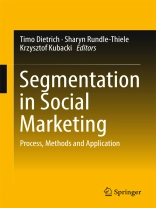This book brings together current innovative methods and approaches to segmentation and outlines why segmentation is needed to support more effective social marketing program design. It presents a variety of segmentation approaches alongside case studies of their application in various social marketing contexts.
The book extends the use of segmentation in social marketing, which will ultimately lead to more effective and better-tailored programs that deliver change for the better. As such, it offers a detailed handbook on how to conduct state-of-the-art segmentation, and provides a valuable resource for academics, social marketers, educators, and advanced students alike.
विषयसूची
Introduction.- Chapter 1 Segmentation in Social Marketing: Why we don’t do it as much as we should?.- Part I The segmentation process.- Chapter 2 Segmentation as one of the key benchmarks in Social Marketing.- Chapter 3 The Segmentation Process.- Chapter 4 An umbrella review of the use of segmentation in social marketing interventions.- Chapter 5 How segmentation improves social marketing’s Return on Investment (ROI).- Part II Segmentation methods.- Chapter 6 An overview of different segmentation methods.- Chapter 7 Innovative segmentation methods from commercial marketing for social marketing.- Chapter 8 Advances in segmentation practice.- Chapter 9 Segmentation using two-step cluster analysis.- Part III Segmentation in practice.- Chapter 10 Identity matters: REScue changes and their approach to segmentation.- Chapter 11 Forgetful attempters: Segmentation for the Be Sun Sound Campaign.- Chapter 12 Segmenting the market for safe sex: Fiesta and Kiss condoms.- Chapter 13 Nationwide physical activity campaign: segmenting the VERB market.- Conclusions.- Chapter 14 Why we need segmentation when designing behaviour change programs.
लेखक के बारे में
Timo Dietrich holds a joint position with Griffith University and The University of Queensland as a Postdoctoral Research Fellow. In his Ph D he examined how segmentation and co-design could help improve intervention and service design solutions. Since then he is passionately working on a range of projects that aim to use gamification to foster positive behaviour change. He has worked with industry partners such as Alco Cups, Bendigo Bank, Queensland Catholic Education Commission, Queensland Police Service, Mater Hospital, Southern Cross University, Organ and Tissue Authority Committee, and UNICEF.
Sharyn Rundle-Thiele leads Social Marketing at Griffith University and is Editor of the
Journal of Social Marketing. Her research focuses on behaviour change and she currently serves as an advisor on a diverse range of social marketing projects. Her current projects include changing adolescent attitudes towards drinking alcohol, and increasing healthy eating and physical activity to combat obesity.
Krzysztof Kubacki is Associate Professor in Marketing at Griffith University. Woven throughout his research is an interest in the relationship between social marketing and consumer culture, with his most recent work focusing on physical activity among adults and children and alcohol consumption among young people.












